
Ling Ling Huang's Immaculate Conception is a dazzlingly ambitious feat of storytelling. The narrative revolves around the bond between Mathilde and Enka, two artists, one privileged in many ways, the other decidedly not, at least initially. Narrator Enka befriends the intimidatingly talented Mathilde during their first year at art school and feels continually inferior to her friend's knowledge, growing acclaim, and confidence.
As they mature and their paths diverge, Enka becomes more and more obsessed with Mathilde's life and work. Huang expertly portrays Enka's inner turmoil, her constant struggle between admiration and envy, love and resentment. Mathilde is a brilliant artist, but also deeply traumatized. Her vulnerability makes her intermittently dependent on Enka, who sees her role as Mathilde's caretaker, even at the expense of the latter's agency. Huang depicts with precision the subtle power dynamics that exist between them--the one-sided competition and the ever-present threat of betrayal.
Meanwhile, they exist in a dystopic, chillingly plausible world in which societal inequities are amplified and technology is employed to maintain a rigid social order. Ultimately, Enka uses her husband's research involving a technology called SCAFFOLD, which allows individuals direct access to another person's brain, their thoughts, their creativity, and full interiority. The stated purpose is to help Mathilde bear her emotional burdens, but Enka's motives are hardly pure.
Huang's (Natural Beauty) style is as captivating and distinctive as the story itself, with incisive prose that is alternately evocative, funny, and caustic. Immaculate Conception investigates the dark side of ambition, the seductive power of technology, and the complex nature of human relationships--a simmering rumination on covetousness, resilience, and atonement. --Elizabeth DeNoma, executive editor, DeNoma Literary Services, Seattle, Wash.

